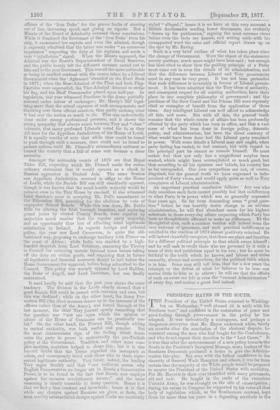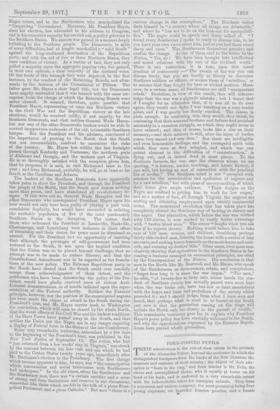PRESIDENT HAYES TN THE SOUTH.
THE President of the United States returned to Washing- ton on Wednesday, " well pleased (it is said) with his Southern tour," and confident in the restoration of peace and good-feeling through perseverance in the policy he has adopted. It was undoubtedly a courageous, and perhaps a dangerous enterprise that Mr. Hayes undertook when, barely six months after the conclusion of the electoral dispute, he ventured among the men who had fought for the Confederacy, and who do not repent their devotion to the "Lost Cause." It is true that after the announcement of a new policy towards the South in the President's Inaugural Message, many leaders of the Southern Democrats professed a desire to give the Adminis- tration fair-play. But even with the fullest confidence in the sincerity of General Wade Hampton and others, it was far from certain that the majority of the White people would be prepared to receive the President of the United States with cordiality. For Mr. FlayeS is in their eyes identified with many grievances, old and new. He fought in the ranks of the victorious Unionist Army, he was strongly on the side of emancipation ; during his career in Congress he supported by his votes all that body of legislation which, as the Southerners contend, kept them for more than ten years in a degrading servitude to the
Negro voters, and to the Northerners who manipulated the " Carpet-bag " Government, Moreover, Mr. President Hayes, since his election, has advocated in his address to Congress, and in his executive capacity has carried out, a policy grievous to the Southern States. His success was gained in a manner deeply irritating to the Southern people. The Democrats, in spite of many difficulties, had at length marshalled a " solid South" against the long-continued domination of the Republican party, and with the aid of two or three Northern States, they were confident of victory. As a matter of fact, they not only polled a majority upon the aggregate popular vote, but gained, in their own opinion, a clear majority of the electoral votes. Of the fruits of this triumph they were deprived, in the first instance, by the conduct of the Returning Boards, and after- wards by the decision of the Commission of Fifteen. The latter gave Mr. Hayes a clear legal title, but the Democrats have angrily contended that it was tainted with the same cor- ruption from the charge of which the Returning Boards were never cleared. It seemed, therefore, quite possible that President Hayes, representing at once the Northern victory in the Civil War and the Republican victory at the late elections, would be received coldly, if not angrily, by the Southern Democrats, and that neither General Wade Hamp- ton nor any of the other Democratic leaders would be able to control inopportune outbreaks of the old, intractable Southern temper. But the President and his advisers, convinced of the importance of proving to the North that the South was not irreconcilable, resolved to encounter the risks of the journey. Mr. Hayes has within the last fortnight passed through Kentucky and Tennessee, the northern parts of Alabama and Georgia, and the western part of Virginia. He is so thoroughly satisfied with the reception given him, that he proposes, it is said, to visit Richmond later in the year ; and from Richmond, probably, he will go at least as far South as the Carolinas and Atlanta.
The leaders of the Southern Democrats have apparently taken pains to show the President, and through the President the people of the North, that the South now desires nothing more than peace, and have abandoned all revolutionary de- signs. If this were not so, General Wade Hampton and the other Democrats who accompanied President Hayes upon his tour would not only have been guilty of playing a part with scandalous duplicity, but would have succeeded in enlisting the excitable population of five of the most passionately Southern States in the deception. The notion that those who welcomed the President at Louisville, Nashville, Chattanooga, and Lynchburg wore insincere in their offers of friendship and their desire for peace must be dismissed as absurd. Yet the President lo:t no opportunity of insisting that although the privileges of self-government had been restored to the South, it was upon the implied condition that the Union was to be placed beyond challenge, that no Attempt was to be made to restore Slavery, and that the Constitutional Amendment was to be regarded as the founda- tions of the new policy. The Extreme Republican party in the North have denied that the South could ever candidly accept these acknowledgments of their defeat, and the Politicians who have been denouncing the policy of the Pre- sident would have gladly received news of riotous Anti- Unionist demonstrations, or of insults inflicted upon the repre- sentatives of the Federal authority. Neither the Unionist principle, however, nor the position of the emancipated negroes has been made the object of attack in the South during the
President's .tour, and Mr. Hayes carries back to Washington the conviction, which will soon be shared by the whele North,
that the worst effects of the Civil War and the darkest traditions of the Slave Power have passed away in the South, and that neither the Union nor the Negro are in any danger requiring a display of Federal force in the States of the late Confederacy. Some very remarkable testimony, antecedent by a few days to the beginning of the President's tour, was published in the
New York, Nation of September 13. The writer, who had "just returned from a few weeks' stay in Virginia," was struck
by the contrast between his late visit and one which he had
paid to the Cotton States twenty years ago, immediately after Mr: Buchanan's election to the Presidency. The first change
Which became apparent to him, he says, was "the emancipation Which conversation and social intercourse with Northerners had undergone." In the old times, when the Southerner and
the Northerner met, there was "a certain acridity and a sense of strong and deep limitations and reserves in our discussions, somewhat like those which are felt in the talk of a pious Evan- gelical Protestant and a pious Catholic." But now " there is a curious change in the atmosphere." The Northern visitor finds himself in "a country where all things are debateable," and whore he "has not to be on the look-out for susceptibili- ties." The negro could be openly and freely talked of. "I found every Southerner I spoke to ready to discuss him, to let you have your own views about him, just as you had them about sheep and oxen." The Southerners themselves perceive and confess the change. As one of them said to the writer in the Nation, "Yes, sir! We have been brought into intellectual and moral relations with the rest of the civilised world." There is one restriction, it is true, upon this novel freedom of controversy ;—" The events of the war you can discuss freely, but you are hardly at liberty to denounce Southern soldiers or officers, or accuse them of 'rebellion,' or to assume that they fought for base or wicked motives. More- over, in a certain sense, all Southerners are still unrepentant rebels.' Doubtless, in view of the result, they will acknow- ledge that the war was a gigantic mistake ; but I found that if I sought for an admission that, if it was all to do over again, they would not fight, I was touching on a very tender point, and I was gently but firmly repelled. The reason is plain enough. In confessing this, they would, they think, be confessing that their sons and brothers and fathers had perished miserably in a causeless struggle, on which they ought never to have entered ; and this, of course, looks like a slur on their memory,—and their memory is still, after the lapse of twelve years, very sacred and very dear." But these are intelligible and even honourable feelings, and the revengeful spirit with which they were at first mingled, and which was one potent element in the difficulties of " reconstruction," is dying out, and is indeed dead in most places. To the Southern farmers, the war, says the observer whom we are quoting, "is history, tender, touching, and heroic history, if you will, but having no sort of connection with the practical life of to-day." The Southern mind is not " occupied with schemes for the assassination and spoliation of negroes and for a new rebellion," but with plans of money-making, of which their farms give ample evidence. "Their designs on the Negro are confined to getting him to work for low wages," and as a matter of fact, all through Virginia the negroes are seeking and obtaining employment upon strictly commercial terms. The economical revolution that has taken place has completely altered the Southern way of looking at slavery and the negro. One plantation, which before the war was worked with 150 slaves, is now worked to vastly better advantage with "twelve hired men." The owner "laughs when you ask him if he regrets slavery. Nothing would induce him to take care of 150 men, women, and children, furnishing perhaps thirty able-bodied men, littering the house with a swarm of lazy servants, and making heavy demands on the meat-house and corn- crib, and running up doctors' bills." Other cases, even more con- clusively showing that agriculture in the Southern States is be- coming a business managed on economical principles, are cited by the Correspondent of the Nation. His conclusion is that
men in the North like Mr. Boutwell and Mr. Blaine, who speak of the Southerners as slave-owners, rebels, and conspirators, "forget how long it is since the war began." "The men," he adds, "of twenty-five to forty into whose hands the con- duct of Southern society has actually passed were mere boys when the war broke out, have but few or faint associations with the hopes and fears and prejudices of the society which preceded it ; and I should judge, from what I have seen and heard, that perhaps what is most to be feared at the South just now is that the generation coming on the stage will imitate the North only too closely in the pursuit of wealth." This remarkable testimony goes far to explain why President Ha,yes's peace policy has been cordially welcomed in the South, and why the apprehensions expressed by the Extreme Repub- licans have proved wholly groundless.



































 Previous page
Previous page